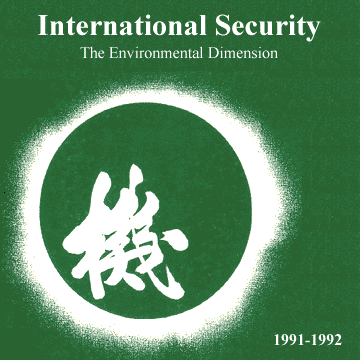- About this Program
- 2012 Conflict in the 21st Century
- 2011 Our Nuclear Age: Peril and Promise
- 2010 South Asia: Conflict, Culture Complexity, and Change
- 2009 Cities: Forging an Urban Future
- 2008 Global Poverty and Inequality
- 2007 Global Crises: Governance and Intervention
- 2006 The Politics of Fear
- 2005 Oil and Water
- 2004 Dilemmas of Empire and Nation Building
- 2003 Sovereignty and Intervention
- 2002 Global Inequities
- 2001 Race and Ethniciity: A Global Inquiry
- 2000 Global Games: Sports, Politics, and Society
- Symposium
- 1999 Global Crime, Corruption, and Accountability
- 1998 Exodus and Exile: Refugees, Migration, and Global Security
- 1997 The Future of Democracy
- 1996 Religion, Politics, and Society
- 1995 20/20 Visions of the Future
- 1994 Ethnicity, Religion and Nationalism
- 1993 Transformations in the Global Economy
- 1992 - International Security: The Environmental Dimension
- International Symposium
- Special Events
- Workshops
- 1991 Confronting Political and Social Evil
- 1990 The Militarization of the Third World
- 1989 Drugs, International Security and U.S. Public Policy
- 1988 Foreign Policy Imperatives for the Next Presidency
- 1988 Covert Action and Democracy
- 1987 The West Bank and Gaza Strip
- 1986 International Terrorism
- News
- Press Clips
- Calendar
- Resources
EPIIC Archives
1992 - International Security: The Environmental Dimension

|
|
* 35% of the earth's land surface and 20% of the world's population is threatened by desertification.
* One billion of the world's 5 billion people live below the World Bank's poverty line -- an annual income of less than $370 per year.
* Estimates for the cost of the recent war in the Gulf are over $30 billion. In 1989, the U.S. Deparment of Defense spent as much as $54 billion, to safeguard oil supplies in the Gulf.
Given the rapid increase in world population and the ongoing environmental crises in such places as the Gulf, the African Sahel, the Amazon rainforest, and Eastern Europe, do we need a redefined vision of global security? This international symposium convened to consider how interdependence in economic and environmental affairs has begun to erode traditional notions of security and national sovereignty. What are the implications of environmental degredation for U.S. foreign policy? What environmentally-sound policies are likely to reduce the potential for international and domestic conflict? What are the tensions between environment and development? Do states go to war to gain access to strategic resources? Among the issues we considered were: the ecological impact of poverty; the reversible and irreversible impacts of war on the environment; the competition for oil and water rights in the Middle East; land degredation and environmental refugees in the Philippines; apartheid's environmental toll in South Africa; the effects of the national security complex and weapons industry in the U.S.; rapid population growth in Mexico; and militarism in Central America. By intensifying structural violence and threatening irreversible global deterioration, environmental, ecological time-bombs are as dangerous as arms races -- perhaps more so -- as they are often unacknowledged and unanticipated.

